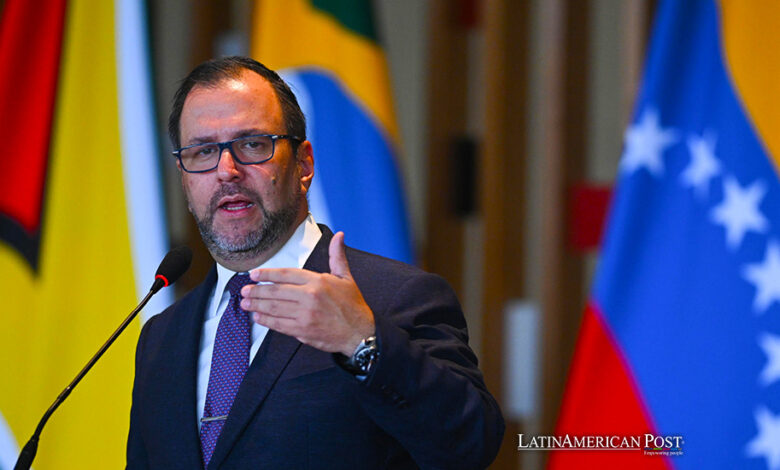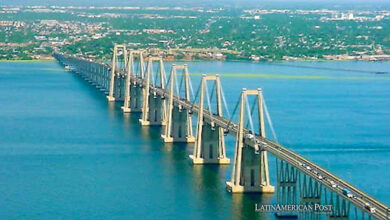Venezuela-Guyana Dispute Leads to Diplomacy in Brazil Over Oil-Rich Esequibo

Venezuela and Guyana’s diplomatic talks in Brazil over the Esequibo region, rich in oil and gas reserves, marked a commitment to peaceful resolution and avoiding violence in a longstanding territorial dispute.
Geopolitical Tensions Unveiled
In a significant development concerning South American geopolitics, Venezuela and Guyana recently engaged in high-level diplomatic talks to address their longstanding territorial dispute over the Esequibo region. Hosted by Brazil, these talks have brought to the forefront a complex issue involving a 160,000 square kilometer area known for its dense jungle and, more recently, its vast oil and gas reserves.
The Esequibo region, recognized generally as part of Guyana, has been the subject of renewed claims by Venezuelan President Nicolas Maduro. This dispute, which dates back over a century, has gained prominence in recent years due to the discovery of significant oil and gas reserves in the area. Since 2015, dozens of significant oil discoveries have been made in Esequibo’s adjacent offshore areas, heightening the stakes in this territorial contention.
At the heart of these talks, held in Brazil’s capital, were commitments from both nations to avoid violence or threats, emphasizing diplomacy as the preferred route for resolution. Venezuelan Foreign Minister Yvan Gil underscored the agreement to continue the dialogue through diplomatic channels. This approach represents a shift in tone from Venezuela, which has historically taken a more assertive stance on its claim to Esequibo.
Guyana’s Optimism and International Legal Support
Guyanese Foreign Minister Hugh Todd expressed optimism about the diplomatic process, indicating confidence in “real advances” in the next meeting. Significantly, Guyana remains committed to involving the International Court of Justice (ICJ) in resolving the dispute. In December, the ICJ ruled that Venezuela should refrain from actions altering the situation on the ground in Esequibo, a decision aligning with Guyana’s stance on international legal arbitration.
The follow-up meeting, also to be hosted by Brazil, points to a growing role for regional diplomacy in resolving such disputes. Brazil’s involvement as a mediator underscores its influence in South American affairs and its interest in maintaining regional stability.
Strategic Significance of the Esequibo Region
The Esequibo dispute’s escalation in recent years can be attributed to the region’s oil and gas potential. These resources are not just economic assets but also tools of geopolitical power, making the area strategically significant for both countries. For Guyana, a small nation with a burgeoning oil sector, the stakes are exceptionally high. The revenues and investments from these oil reserves are critical for its economic development and future prosperity.
For Venezuela, reeling under economic crises and sanctions, the Esequibo region presents an opportunity to bolster its dwindling oil industry. However, Venezuela’s renewed claim and assertiveness over the region have been met with international criticism, especially given the country’s current political and economic instability.
The diplomatic talks represent a critical juncture in this longstanding dispute. While they signal a willingness to engage in peaceful dialogue, the underlying issues remain complex and deeply rooted in historical claims and national identities. The resolution of this dispute will require careful negotiation, respect for international law, and consideration of the region’s indigenous communities and environmental implications.
Natural Resource Competition and International Relations
Moreover, the Esequibo dispute indicates a broader trend in international relations, where territorial claims are increasingly intertwined with natural resource competition. As the world grapples with energy transitions and the growing importance of oil and gas reserves, such disputes will likely become more frequent and contentious.
The involvement of the ICJ and the emphasis on diplomatic channels also highlight the importance of international legal frameworks and multilateralism in resolving territorial disputes. In a world where unilateral actions often dominate headlines, the Esequibo talks offer a model for peaceful dispute resolution based on legal principles and regional cooperation.
However, the path to a resolution is fraught with challenges. The talks must navigate a delicate balance between national interests, legal precedents, and regional dynamics. The role of external actors, including multinational oil companies operating in the region, adds another layer of complexity to the negotiations.
Also read: Lula Pledges Federal Action in Brazil’s Land Conflict After Tribal Leader’s Death
The diplomatic talks between Venezuela and Guyana over the Esequibo region represent a significant step toward resolving a longstanding dispute in a resource-rich area. The commitment to diplomacy and legal arbitration offers hope for a peaceful resolution. However, the path forward will require sustained dialogue, respect for international norms, and careful consideration of the broader implications for regional stability and international relations. As the world watches, the outcome of these talks could set a precedent for how resource-driven territorial disputes are resolved in the 21st century.





